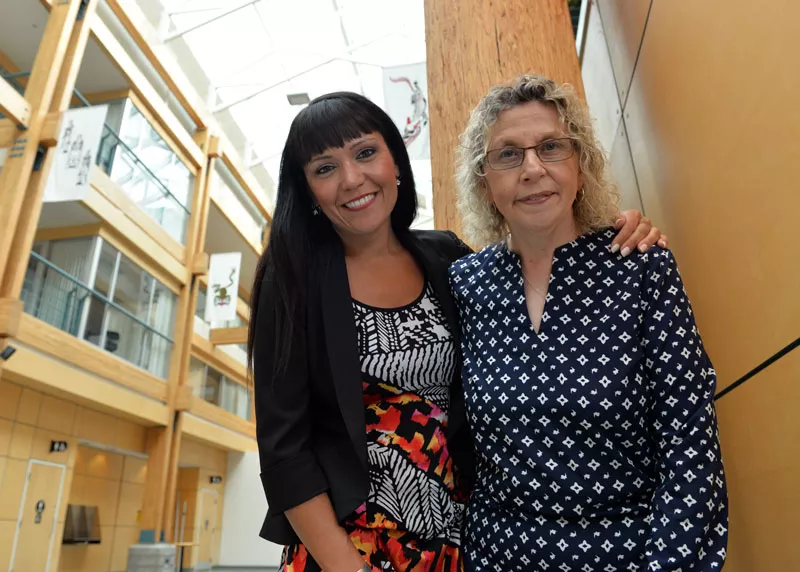Education key to reconciliation, says Truth and Reconciliation Commission researcher

Universities such as UNBC can play a key leadership role in establishing and maintaining respectful relationships between Aboriginal and non-Aboriginal people.
That was one of the key findings in the Truth and Reconciliation Commission’s final report which issued 94 Calls to Action, recommending a sweeping transformation of all sectors of Canadian society, including education, language and culture, health, child welfare, and justice.
“The Truth and Reconciliation Commission believes education is key to reconciliation,” said Dr. Paulette Regan, the senior researcher and lead writer for the TRC, told UNBC’s Senate on Aug. 24 during a special presentation. “The education system must be decolonized and transformed, universities and educators play a leadership role in this process, and reconciliation begins with each and every one of us.”
Dr. Regan described how the TRC was established and explained that its mandate was to document the history and legacy of the residential school system in Canada and to foster reconciliation between Indigenous peoples and Canadians.
Regan said more than 7,000 testimonial statements from survivors were collected over the six years of the Commission’s work. The TRC was also mandated to establish the National Centre for Truth and Reconciliation, which is now at the University of Manitoba in Winnipeg. The centre is a permanent home for all of records and materials of the Commission. It’s a place of learning, research, and dialogue where the truths of survivors’ experiences are honoured and kept safe for future generations.
“It’s a living legacy that promotes understanding of the past and new research on reconciliation,” said Regan. “(Indigenous people) now have access to their own history like they’ve never had before. It’s for survivors’ families, educators and researchers.”
The NCTR is establishing partnerships with other universities, colleges and organizations across the country. As more partners join the centre, the goal is to create the broadest possible collaborative network from coast to coast to coast.
Dr. Rheanna Robinson, UNBC faculty member and Senior Advisor to the President on Aboriginal Relations, said she continually sees universities moving forward to achieve the TRC’s calls to action.
Programs are being developed to meet standards and expectations and First Nations Studies is a mandatory course in some programs and students are learning more and more about Indigenous rights and laws, she said.
“We’re developing a mutual respect with each other and I have seen a significant transformation in so many ways that are meaningful and enduring,” she told the packed Senate Chambers. “There are huge opportunities for us to hear stories and listen to the voices of Aboriginal people. It’s part of knowledge exchange and dialogue. The element of reciprocation is essential.”
As for UNBC, the central campus in Prince George was founded and built in the traditional territory of the Lheidli T’enneh. UNBC’s Coat of Arms, as well as key art pieces, the talking stick, convocation chairs and Senate Chamber doors carry symbols of UNBC’s relationships and agreements with First Nations people, the land, animals and plants at the university.
Another symbol of celebrating Indigenous knowledge at UNBC can be seen at the pit house, a traditional First Nation dwelling in the Dakelh style, built on UNBC grounds in 2014 by students who were enrolled in the experiential learning course.
The Elder in Residence program, as well as the Aboriginal Alumni Speaker Series that are funded by the provincial Aboriginal Services Plan initiative also enhance the learning and cultural experience for students, faculty and staff at UNBC.
“We don’t have to look too far to see where UNBC has embraced First Nations and Aboriginal culture,” Robinson said. “UNBC is well-positioned to contribute to the goal of meeting the TRC’s calls to action. Engaging in dialogue about how we can approach teaching and research through a reconciliation lens will reveal our institutional strengths and identify gaps that inform how we respond to the TRC’s calls to action in ways that can truly change minds and hearts.”
Above, Dr. Rheanna Robinson, UNBC faculty member and Senior Advisor to the President on Aboriginal Relations, and Dr. Paulette Regan, the senior researcher and lead writer for the Truth and Reconciliation Commission made a special presentation to UNBC's Senate.